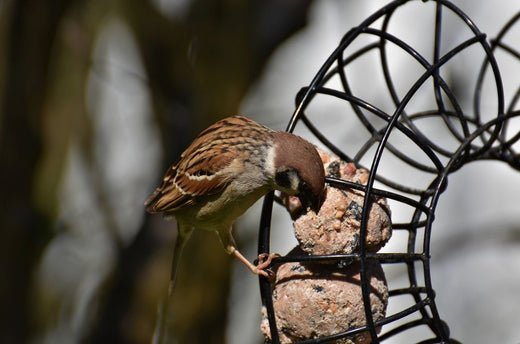
Preventing Disease Spread in Garden Birds
Share
Feeding garden birds is a delightful way to support wildlife and bring nature closer to home. However, crowded feeders and poor hygiene can create conditions that allow diseases to spread. By adopting simple practices, you can help ensure the safety and well-being of your feathered visitors. This guide explores the best ways to prevent disease transmission among garden birds, from maintaining hygiene to managing feeding sites and choosing high-quality food.
Why Disease Prevention Matters
Garden birds often congregate around feeding stations, creating ideal conditions for disease transmission. Pathogens like trichomonosis, salmonella, and avian pox can spread through shared food, water, or contaminated surfaces. Disease outbreaks can have devastating impacts on local bird populations, making prevention a critical responsibility for bird enthusiasts.

Key Practices for Disease Prevention
1. Maintain a Regular Cleaning Schedule
Cleanliness is the cornerstone of disease prevention. Follow these steps:
- Feeders: Clean weekly with warm, soapy water and disinfect using a wildlife-safe product like Safe4 Disinfectant.
- Bird Baths: Empty, scrub, and refill bird baths daily to prevent waterborne diseases.
- Ground Areas: Rake and remove uneaten food and droppings regularly to minimise contamination.
2. Rotate Feeding Sites
Avoid overcrowding and reduce the risk of waste build-up by moving feeders to different locations in your garden. Allow previous feeding areas to rest and recover before reusing them.
3. Provide High-Quality Bird Food
Low-quality or unclean food can harbour mould and toxins that harm birds. Haith’s SuperClean™ bird diets offer dust-free, rigorously tested food that reduces the risk of contamination and supports bird health. Choose foods free from fillers and opt for high-energy options that birds can consume entirely.
4. Avoid Overcrowding
Spread feeders across multiple locations to prevent large groups of birds gathering in a single spot. Overcrowding increases the likelihood of direct contact and the spread of pathogens.
5. Inspect Feeders and Food Regularly
Monitor feeding stations for signs of spoilage or contamination:
- Spoiled Food: Remove damp or mouldy food immediately.
- Damaged Feeders: Repair or replace feeders with sharp edges or cracks that can harbour bacteria.
6. Encourage Natural Foraging
Support birds’ natural behaviours by:
- Planting native shrubs and trees for seeds and berries.
- Leaving leaf litter to attract insects for ground-foraging species.
- Placing food in tree crevices or on natural surfaces to mimic wild feeding environments.
Recognising Signs of Disease
Early detection is vital to stopping disease from spreading. Watch for birds exhibiting:
- Lethargy or Weakness: Difficulty flying or prolonged resting.
- Fluffed-Up Feathers: Birds puffing up their feathers to conserve body heat.
- Dirty or Matted Plumage: Particularly around the face or beak.
- Swollen Eyes or Growths: Indicators of infections like avian pox.
If you notice these symptoms:
- Pause Feeding: Temporarily stop providing food to reduce congregation.
- Clean Thoroughly: Disinfect all feeding and drinking areas before resuming.
- Consult Wildlife Experts: Report any unusual deaths or outbreaks to local wildlife authorities.
The Role of High-Quality Food
Feeding birds with premium, clean food not only supports their health but also reduces the risk of waste and contamination. Haith’s SUPERCLEAN™ diets are designed to meet these needs, offering:
- Dust-Free Seeds: Minimising respiratory risks and reducing mess.
- Nutritious Ingredients: High-energy mixes that provide essential nutrients.
- Reduced Waste: Ensuring most, if not all, of the food is consumed.
Creating a Safer Feeding Environment
In addition to cleaning and managing food quality, consider the layout of your garden:
- Spacing: Place feeders at least two metres apart to limit close contact.
- Shelter: Position feeders near hedges or trees for cover but away from predators.
- Drainage: Use well-drained areas for ground feeding to keep food dry and fresh.
Supporting Bird Welfare Year-Round
Different seasons present unique challenges for birds. Adjust your practices accordingly:
- Winter: Focus on high-energy foods and ensure feeders are clean and stocked.
- Spring: Provide calcium-rich options to support nesting and egg production.
- Summer: Keep bird baths clean and full to prevent dehydration.
- Autumn: Offer nutrient-dense mixes to prepare birds for migration or colder weather.

A Shared Responsibility
Preventing disease transmission among garden birds is a shared effort between bird lovers and the wider community. By combining good hygiene, thoughtful feeding practices, and high-quality food, we can all play a part in protecting our local bird populations.
Haith’s is dedicated to supporting bird welfare through innovation and education. Explore our range of SuperClean™ bird food, feeders, and cleaning products at Haith’s, and join us in creating a healthier future for garden birds.
Written by Haith's
